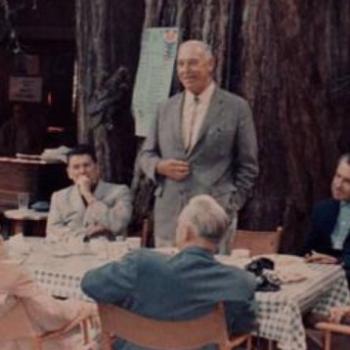If you want to see card tricks performed with bewildering skill, just click over to YouTube and search for “Ricky Jay.” For example:
Watching Ricky Jay perform will teach you what magic tricks are supposed to look like, but no matter how closely you watch him, you won’t ever learn how the trick is done. To learn that, you need to watch someone who isn’t a master at the craft. The clumsier and more inept the magician, the more you’ll be able to see how the trick works.
That’s why it can be instructive, sometimes, to check in with our old friends at the Institute on Religion and Democracy — a lower-tier religious right farm team that has, for years, been trying and failing to establish itself as an anti-liberal watchdog and a key player in the tribal gatekeeper industry. IRD has always been a reliable team player, gamely attacking whoever they’re assigned to attack, so they’ve always managed to secure a share of the wingnut welfare from right-wing foundations that keeps such PR-tanks afloat. But they’ve never quite been able to figure out what to do with that money beyond joining the chorus on the culture-warrior talking points of the day.
The latest effort from IRD is a book by Chelsen Vicari, the group’s “evangelical program director.” The title of that book aptly conveys her portfolio in that job: Distortion: How the New Christian Left Is Twisting the Gospel & Damaging the Faith.

To give you a sense of what the book is like, the cover offers enthusiastic blurbs from three people: T.L. Tony Perkins, Fox News personality Todd Starnes, and Vicari’s boss at IRD, Mark Tooley. I’m not sure it’s possible to come up with a list of three other people with such an extravagant reputation for dishonesty. (I was thinking maybe Baron Munchhausen, Richard Nixon and Charles Ponzi?)
Oh, and it’s published by Charisma Media. Because nothing says “integrity” like the Charisma brand.
It’s also the sort of book that, for example, quotes G.K. Chesterton — with a footnote citing the Chesterton quotes page on GoodReads.
Yes, I was skimming the footnotes, because the advance hype for this book from IRD and Charisma promised that Vicari would “name names” — boldly pointing an accusing finger at specific New Christian Leftists who are obviously intent on Twisting the Gospel & Damaging the Faith. It’s quite a list of names: Richard Cizik, Lynne Hybels, Tony Campolo, Jim Wallis, Rachel Held Evans, Tony Jones, Ben Corey, Shane Claiborne, Sarah Bessey …
Yes, this is a book that denounces Sarah Bessey as a menace to the gospel and the Christian faith. That’s just … wrong.*
Oh, and Vicari also goes after the Rev. Jeremiah Wright, who seems to be the only non-white Christian she’s heard of.
In discussing all of these alleged Leftists, Vicari fumbles one particular sleight of hand trick often enough to help us see how the trick is done. As we’ve discussed a bit here recently, recent decades have seen a radical shift in white evangelical self-identity — a shift away from an identity based on religious distinctives and toward an identity based on partisan political affiliation. Reinforcing that shift is the role and function of tribal gatekeepers, and tribal gatekeeping is how Vicari earns her paycheck at IRD.
This shift in identity creates a dilemma for those who remain rooted in the religious temperaments and beliefs that formerly identified evangelicalism, but who do not share the reflexive, uncritical party-line Republicanism now required for membership in the tribe. They’re left without any vocabulary to describe their identity. Are they “evangelicals”? They used to be — that is, “evangelical” used to mean what they still are, but it no longer does so, even if what they are has not changed. So what language remains to describe them?
It doesn’t much matter. Any term or label they choose, at this point, will be conscripted by the tribal gatekeepers and wielded as an epithet to anathematize them. Vicari performs this trick with great enthusiasm, but little dexterity. Post-evangelical, progressive, feminist, justice, emergent, missional … these are all dirty words in Distortion.
When this trick is performed skillfully, the gatekeeper will co-opt those words in a way that, well, distorts them into something seemingly nefarious. They will suggest that to be “post-evangelical” is to be post-Jesus, or that to be “progressive” is to be progressing away from Jesus. Vicari lacks that subtle touch. For her, words like “feminist” and “social justice” are just self-evidently wicked. This is what propaganda looks like when it is written by someone who has been reading only propaganda.
Elizabeth Stoker Breunig describes reading Distortion this way: “You just sort of swim in an ether of dog-whistling and come away dazed but empty-handed.”
That’s actually one of Breunig’s gentler sentences in her review, which deals only with the first chapter of Vicari’s book. That chapter is titled, “Unmasking the Social Justice Facade.” (“What could this mean?,” Breunig asks. “When you unmask a facade, is one mask actually wearing yet another mask?”) A taste:
Vicari’s prose perambulates in a labyrinthine style. There is no sign posting. She is given to momentary lapses into personal narrative. Her chapter on “social justice” opens up with an anecdote about going to Haiti, and includes reminiscences on her college life: “it stunk to speak up in my political science classes and call for cuts in government entitlements.” My sympathy for political science professors has never been so strong.
Go savor the entire thing. (And be sure to pay special attention to the bit on Malcolm X, whose very name apparently causes Vicari to recoil in visceral horror.)
Distortion is, I think, a usefully horrible book. This is partisan tribal gatekeeping laid bare. This is the trick that has been performed for and performed on white evangelicalism over the past 40 years. This shows the sleight of hand that transformed Billy Graham into Franklin Graham and twisted Ned Flanders into Bryan Fischer.
– – – – – – – – – – – –
* I took a public speaking class in college, and one of our workshops involved dealing with hecklers. Each of us was designated the lead heckler for one classmate. I was assigned to heckle Cindy. She was probably the nicest, sweetest person in the class — someone who spent her free time volunteering with the Special Olympics. And that turned out to be the topic for her speech. I had to heckle the Special Olympics. I had to attack an icon of kindness and hope.
That was an awful thing to have to do, but it was my assignment, so I did it. I’m guessing that’s how Vicari feels about being assigned to write a hit-piece denouncing Sarah Bessey as an evil leftist menace to the gospel.
















